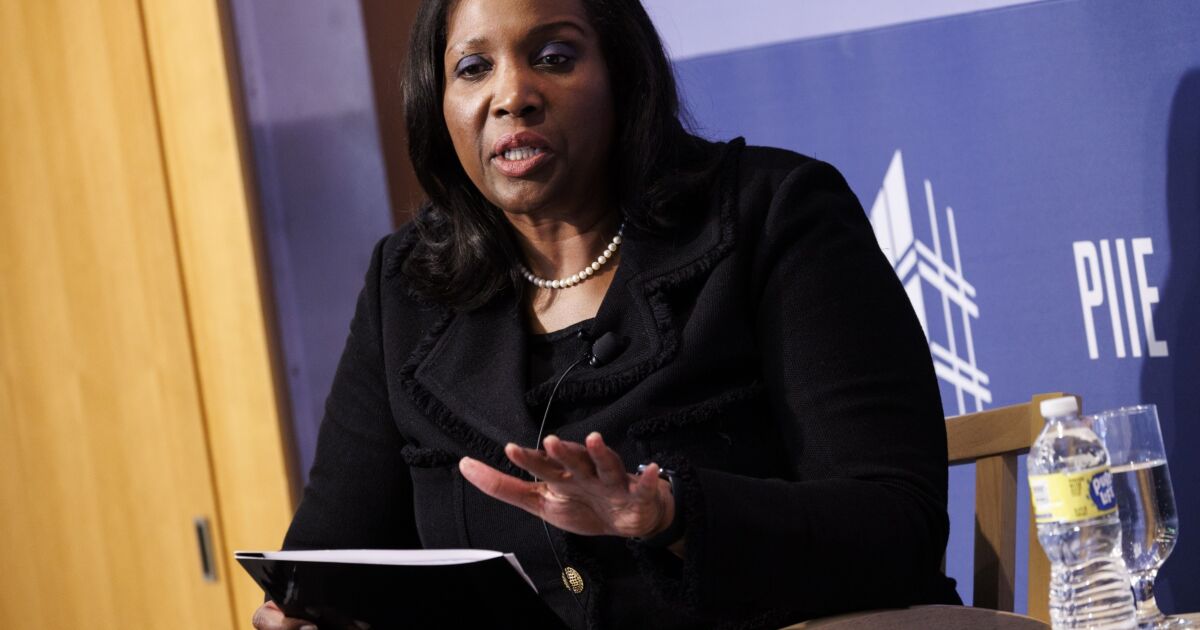
Federal Reserve Board Gov. Lisa Cook said artificial intelligence technology is poised to be a boon to innovation, productivity and even the labor market, but it will also come with new ethical obligations.
Cook delivered a keynote address Friday morning at the National Bureau of Economic Research's Economics of Artificial Intelligence Conference in Toronto. During her remarks, which were broadly supportive of the technology, she said humans would still be accountable for actions they take based on AI recommendations.
"AI makes predictions, but AI does not make choices," she said. "Ultimately, human beings are still in control."
Cook also stressed the importance of ensuring transparency and accountability around AI-generated decisions.
"Importantly, in the policy arena — as well as health care, consumer finance, insurance, and many others — decisionmakers have legal and ethical duties to be deliberate about the effects their choices have on affected groups," she said. "In this context, an AI black-box with no insight into the decision-making process is of limited value."
Cook added that she looks at AI-generated forecasts with a "skeptical eye" if they are not accompanied by an explanation of what drives them. She said this is especially important when someone is impacted by a decision and wants to appeal it.
"I am particularly interested in seeing progress on 'explainable AI,'" she said. "Which may help bridge the divide between the technical sphere and the user."
Bank regulators have been monitoring the advancement of AI and its potential implications for the banking sector for years, but have only recently begun issuing guidance around the subject, with a focus on its potential to discriminate against certain types of borrowers. In July, Fed Vice Chair for Supervision Michael Barr warned that the technology could "perpetuate or even amplify" bias in the mortgage lending sector.
Consumer Financial Protection Bureau Director Rohit Chopra has been the administration's most ardent skeptic of AI in financial underwriting. Last year he warned firms to be wary of decisions generated by black-box algorithms, noting that they are still responsible for acting upon such recommendations.
"The law gives every applicant the right to a specific explanation if their application for credit was denied, and that right is not diminished simply because a company uses a complex algorithm that it doesn't understand," he said.
During her remarks, Cook — an economist by training — said further advancements in AI could be beneficial to the Fed's dual mandate of maximum employment and stable pricing.
"When firms deploy technologies that make workers more productive, they create the conditions for greater wage growth consistent with stable prices," she said. "And the labor market adjustment that follows as the economy adapts to technical change can affect maximum employment."
Cook brushed off concerns that proliferation of generative AI — software that can generate unique content based on natural language prompts — will lead to widespread disruption of the labor market. She noted that, historically, whenever new technological advancements render certain types of work obsolete, it also creates new types of work and brings efficiency to existing ones.
"While some observers might warn that means fewer such workers, it is more likely we will need more of them," she said. "After all, when knowledge workers can accomplish more in an hour, firms have an incentive to use more of them, not fewer."
Cook sees the potential for AI to increase the demand for workers in the science, technology, engineering and mathematics, or STEM, fields as well as heightened demand for certain "social skills" as well. But, she noted, the ultimate impact of AI on the economy will depend largely on how well the labor market prepares for the change.
"The benefit of AI to society as a whole will depend on the adaptability of workers' skills, how well they are retrained or redeployed, and how policymakers choose to support the groups that are hardest hit by these changes," she said.



